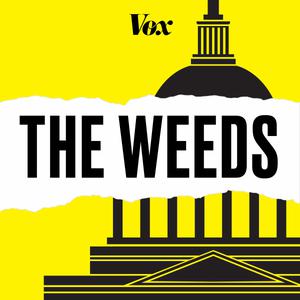
Worldly
Vox Media Podcast Network
Your weekly guide to the world.
- 50 minutes 23 secondsThe end of the World(ly)
In the very! last! episode! of the Worldly podcast, Zack interviews renowned economic historian Adam Tooze about his forthcoming book, Shutdown — an early history of the year 2020, one that felt to many like the end of the world as they knew it. Zack and Adam discuss what the fateful year taught us about the global economic system, the rise of China, and the stability of the US-led world order. And don’t miss goodbye messages from Jenn and Zack (at the start and end of the show). We love you, listeners!
References:
Preorder our guest Adam Tooze’s new book, Shutdown, the subject of the conversation.
Hosts:
Zack Beauchamp (@zackbeauchamp), senior correspondent, Vox
Jennifer Williams (@jenn_ruth), senior foreign editor, Vox
Jen Kirby (@j_kirby1), foreign and national security reporter, Vox
Consider contributing to Vox:
If you value Worldly’s work, please consider making a contribution to Vox:
More to explore:
Subscribe for free to Today, Explained, Vox’s daily podcast to help you understand the news, hosted by Sean Rameswaram.
About Vox:
Vox is a news network that helps you cut through the noise and understand what's really driving the events in the headlines.
Follow us:
Newsletter: Vox Sentences
Learn more about your ad choices. Visit podcastchoices.com/adchoices
12 August 2021, 7:34 pm - 42 minutes 59 secondsAuthoritarians without borders
Zack, Jenn, and Jen Kirby look at how authoritarianism has become internationalized, through the lens of two recent news stories: 1) Fox News host Tucker Carlson choosing to broadcast his show from Hungary this week; and 2) a Belarusian Olympian in Tokyo seeking asylum out of fear of punishment by the Lukashenko regime after she criticized her coach on social media. They discuss what happened in both of those cases, as well as what the events tell us about the ways authoritarian governments are expanding their international reach, by developing ties with like-minded influential figures in other countries and by threatening — and, in some cases, kidnapping or even assassinating — dissidents abroad.
References:
Zack on why Tucker Carlson’s trip to Hungary matters.
Why US conservatives admire Prime Minister Viktor Orbán.
How Hungary’s democracy died.
The Belarusian Olympian who would not go home.
Here’s the transcript of Belarusian officials pressuring Olympic sprinter Krystsina Tsimanouskaya.
Freedom House’s report on the rise of “transnational repression.”
Hosts:
Zack Beauchamp (@zackbeauchamp), senior correspondent, Vox
Jennifer Williams (@jenn_ruth), senior foreign editor, Vox
Jen Kirby (@j_kirby1), foreign and national security reporter, Vox
Consider contributing to Vox:
If you value Worldly’s work, please consider making a contribution to Vox:
More to explore:
Subscribe for free to Today, Explained, Vox’s daily podcast to help you understand the news, hosted by Sean Rameswaram.
About Vox:
Vox is a news network that helps you cut through the noise and understand what's really driving the events in the headlines.
Follow us:
Newsletter: Vox Sentences
Learn more about your ad choices. Visit podcastchoices.com/adchoices
5 August 2021, 11:28 pm - 41 minutes 44 secondsTrouble in Tunisia
Zack, Jenn, and Jen Kirby discuss the political crisis gripping Tunisia following the president’s decision to fire the prime minister and suspend parliament. Tunisia was the big “success story” of the Arab Spring: the one country whose revolution produced a real, albeit rocky, transition to democracy — a democracy that is now in crisis. The gang explains what’s going on, what it all means for Tunisia’s future, and how — or whether — the international community should respond.
References:
Tunisia’s president fired its prime minister and suspended parliament
Is what happened in Tunisia a coup?
A helpful timeline outlining Tunisia’s democratic transition
Tunisia’s imperfect democracy was still a model, wrote Sarah E. Yerkes in 2019
Foreign Policy on the problem with calling Tunisia the Arab Spring’s “lone success story”
Bloomberg’s Hussein Ibish on why this crisis is testing Tunisia’s political divisions
The US secretary of state’s Tunisia tweets
Hosts:
Zack Beauchamp (@zackbeauchamp), senior correspondent, Vox
Jennifer Williams (@jenn_ruth), senior foreign editor, Vox
Jen Kirby (@j_kirby1), foreign and national security reporter, Vox
Consider contributing to Vox:
If you value Worldly’s work, please consider making a contribution to Vox:
More to explore:
Subscribe for free to Today, Explained, Vox’s daily podcast to help you understand the news, hosted by Sean Rameswaram.
About Vox:
Vox is a news network that helps you cut through the noise and understand what's really driving the events in the headlines.
Follow us:
Newsletter: Vox Sentences
Learn more about your ad choices. Visit podcastchoices.com/adchoices
29 July 2021, 11:30 pm - 45 minutes 4 secondsiSpy
Zack Beauchamp, Jenn Williams, and Jen Kirby discuss the explosive revelations that a number of governments around the world, from Saudi Arabia to Hungary to India, have been using military-grade spyware made by an Israeli firm to secretly hack into the phones of journalists, activists, and political opponents. They explore what we know about the NSO Group, the Israeli company who sold this software; what the technology does; how governments may have used it to spy on critics; and what all of this tells us about the rise of digital authoritarianism.
References:
The Pegasus Project uncovers the potential abuse of NSO Group spyware
The major takeaways from the investigation, according to the Washington Post
And the revelations keep on coming
Hungarian journalists had spyware on their phones
And so did a top rival of India’s prime minister
The Pegasus investigation puts Israel in an uncomfortable position
US and EU officials suspect links between NSO Group and Israeli intelligence
Israel’s defense ministry says “appropriate action” will be taken if NSO violated export permits
Steven Feldstein’s book, The Rise of Digital Repression (and listen to Zack’s interview!)
Israel considered using NSO Group to help track the coronavirus
Hosts:
Zack Beauchamp (@zackbeauchamp), senior correspondent, Vox
Jennifer Williams (@jenn_ruth), senior foreign editor, Vox
Jen Kirby (@j_kirby1), foreign and national security reporter, Vox
Consider contributing to Vox:
If you value Worldly’s work, please consider making a contribution to Vox:
More to explore:
Subscribe for free to Today, Explained, Vox’s daily podcast to help you understand the news, hosted by Sean Rameswaram.
About Vox:
Vox is a news network that helps you cut through the noise and understand what's really driving the events in the headlines.
Follow us:
Newsletter: Vox Sentences
Learn more about your ad choices. Visit podcastchoices.com/adchoices
22 July 2021, 8:11 pm - 52 minutes 42 secondsCuba Libre
Worldly guest co-host Jen Kirby talks to Michael Bustamante, professor of Latin American history at Florida International University and the author of Cuban Memory Wars: Retrospective Politics in Revolution and Exile (2021), about Cuba’s recent protests, the largest in decades. They discuss the origins of the current crisis and what it means for thousands of Cubans to take to the streets to resist the country’s regime. They also talk about the US-Cuba relationship and how the US should — and shouldn’t — respond.
References:
Here’s why Cubans are protesting.
This is a brief explainer on Cuba’s currency devaluation.
Vox wrote about the Biden administration’s Cuba dilemma.
You can find Bustamante’s latest book on Cubans’ memories of the revolution here.
Learn about the artists behind the song “Patria y Vida.” (And listen to the song here!)
Hosts:
Zack Beauchamp (@zackbeauchamp), senior correspondent, Vox
Jennifer Williams (@jenn_ruth), senior foreign editor, Vox
Jen Kirby (@j_kirby1), foreign and national security reporter, Vox
Consider contributing to Vox:
If you value Worldly’s work, please consider making a contribution to Vox:
More to explore:
Subscribe for free to Today, Explained, Vox’s daily podcast to help you understand the news, hosted by Sean Rameswaram.
About Vox:
Vox is a news network that helps you cut through the noise and understand what's really driving the events in the headlines.
Follow us:
Newsletter: Vox Sentences
Learn more about your ad choices. Visit podcastchoices.com/adchoices
15 July 2021, 11:48 pm - 46 minutes 1 secondErdoğan’s enemy in the NBA
Frequent Worldly guest cohost Jen Kirby talks Turkey with NBA player and activist Enes Kanter. Kanter was born in Switzerland to Turkish parents and raised in Turkey, but his criticism of Turkish President Recep Tayyip Erdoğan's ongoing human rights crackdown has made Kanter persona non grata in that country. They discuss how President Joe Biden has handled Turkey so far; the troubling kidnapping of a Turkish-Kyrgyz schoolteacher, part of Erdogan’s campaign of renditions against perceived political enemies; the personal consequences of Kanter's activism; and why he’s excited to become an American citizen soon.
References:
A recap of President Erdoğan’s political purge
Enes Kanter’s op-ed in the Spectator World urged Joe Biden to get tough on Erdoğan
A brief overview of the Biden-Erdoğan meeting
Erdoğan claims the US and Turkey have opened a “new era” in relations
Kanter condemns Turkey’s kidnapping campaign in the Washington Post
Turkey kidnapped Orhan Inandi — and now Erdoğan is bragging about it
The New York Times on Erdoğan’s troubling record of kidnappings
Who is Fethullah Gülen?
And for more on Kanter, read Vox’s 2019 profile
Hosts:
Zack Beauchamp (@zackbeauchamp), senior correspondent, Vox
Jennifer Williams (@jenn_ruth), senior foreign editor, Vox
Jen Kirby (@j_kirby1), foreign and national security reporter, Vox
Consider contributing to Vox:
If you value Worldly’s work, please consider making a contribution to Vox:
More to explore:
Subscribe for free to Today, Explained, Vox’s daily podcast to help you understand the news, hosted by Sean Rameswaram.
About Vox:
Vox is a news network that helps you cut through the noise and understand what's really driving the events in the headlines.
Follow us:
Newsletter: Vox Sentences
Learn more about your ad choices. Visit podcastchoices.com/adchoices
9 July 2021, 4:23 am - 23 minutes 53 secondsBrexit interview
A special repost from the folks at Today, Explained! While the Worldly team is out enjoying the holiday weekend in the States, TEX host Sean Rameswaram helps walk you through what’s going with Brexit right now — chatting with The Atlantic’s Tom McTague about where things are at right now in the UK/EU divorce. They explain (among other things) why it’s taking so look, how Prime Minister Boris Johnson has handled certain things well, and how it’s inflaming old tensions in Northern Ireland.
Learn more about your ad choices. Visit podcastchoices.com/adchoices
1 July 2021, 7:45 pm - 42 minutes 40 secondsHungary's new anti-LGBTQ law gets a red card
Zack, Jenn, and Alex discuss the European soccer dustup over Hungary’s new anti-LGBTQ law. They explain what the Hungarian law does, how the country’s increasingly authoritarian leader Viktor Orbán is using it — and soccer — to further his anti-democratic political aims, why the EU opposes the measure so strongly, and how all of this spilled over into Europe’s marquee soccer tournament. Also, the Worldly team says goodbye to Alex.
References:
The Guardian explains Hungary’s anti-LGBTQ law.
Alex wrote for Vox about how the Germany-Hungary soccer match highlighted the European fight over the law.
The Conversation notes that Orbán’s government is pushing anti-LGBTQ issues to shore up support for next year’s election.
The New York Times writes that the ongoing continental spat over the law is turning into a culture war.
You can find out more about what George Orwell said about sports and politics at the Orwell Foundation.
Here's the Washington Post piece piece Zack read from.
And this is the Hungarian Conservative article Zack cited.
Jenn recommends listening to this On Point episode about Hungary and the decline of democracy.
Hosts:
Zack Beauchamp (@zackbeauchamp), senior correspondent, Vox
Jennifer Williams (@jenn_ruth), senior foreign editor, Vox
Alex Ward (@AlexWardVox), senior reporter, White House, Vox
Consider contributing to Vox:
If you value Worldly’s work, please consider making a contribution to Vox:
More to explore:
Subscribe for free to Today, Explained, Vox’s daily podcast to help you understand the news, hosted by Sean Rameswaram.
About Vox:
Vox is a news network that helps you cut through the noise and understand what's really driving the events in the headlines.
Follow us:
Newsletter: Vox Sentences
Learn more about your ad choices. Visit podcastchoices.com/adchoices
24 June 2021, 7:13 pm - 48 minutes 59 secondsJoe Biden’s Eurotrip
Zack, Jenn, and Alex discuss President Joe Biden’s big trip to Europe, where he met with the other leaders of the G7 and NATO countries as well as with Russian President Vladimir Putin. The gang examine what Biden actually accomplished on his trip, discuss the furor that erupted on Political Science Twitter over a comment Biden made during a press conference, and debate whether the Putin meeting was as important as the media hype made it out to be. Also, Worldly makes an important announcement.
References:
If you want to look at all the fact sheets from Biden’s Europe trip, it’s worth perusing the White House’s Briefing Room website.
Alex wrote about the perils of the Biden-Putin summit and the big bet Biden made.
And here’s the tweet Alex sent, where you can then see the reactions from political scientists.
It’s worth looking back at this past Vox piece on the 2018 G7.
Back in 2018, Zack wrote a good Vox piece on America’s alliances.
Hosts:
Zack Beauchamp (@zackbeauchamp), senior correspondent, Vox
Jennifer Williams (@jenn_ruth), senior foreign editor, Vox
Alex Ward (@AlexWardVox), senior reporter, White House, Vox
Consider contributing to Vox:
If you value Worldly’s work, please consider making a contribution to Vox: bit.ly/givepodcasts
More to explore:
Subscribe for free to Today, Explained, Vox’s daily podcast to help you understand the news, hosted by Sean Rameswaram.
About Vox:
Vox is a news network that helps you cut through the noise and understand what's really driving the events in the headlines.
Follow us:
Newsletter: Vox Sentences
Learn more about your ad choices. Visit podcastchoices.com/adchoices
17 June 2021, 7:06 pm - 46 minutes 46 secondsIntroducing: Now & Then
Now & Then is a new podcast from CAFE hosted by award-winning historians Heather Cox Richardson and Joanne Freeman. Every Tuesday, Heather and Joanne use their encyclopedic knowledge of US history to bring the past to life. Together, they make sense of the week in news by discussing the people, ideas, and events that got us here today.
Learn more: https://cafe.com/now-and-then/
Listen on Spotify: https://open.spotify.com/show/6wDS3Y2t0RyQ3ncCUxiNs6?si=nx7w7exNRZ-AWHLv9T1qZg&dl_branch=1
Listen on Apple: https://podcasts.apple.com/us/podcast/id1567665859
Learn more about your ad choices. Visit podcastchoices.com/adchoices
12 June 2021, 10:00 am - 50 minutes 17 secondsCanada’s reckoning with residential schools
Zack and Jenn talk about the horrifying discovery of the remains of 215 children at a so-called “residential school” in Canada. They talk about the history of these schools, which were a centerpiece of Canada’s long-running effort to wipe out Indigenous culture and identity, and how the discovery of the children’s bodies is forcing a political reckoning with this history among white Canadians. Then they compare how Canada is handling this issue to the way that other countries like the US, Germany, and Japan have dealt with their own histories of atrocity — and how that shapes both politics inside those countries and their relations with other states today.
References:
You can read the final report from Canada’s Truth and Reconciliation Commission here or on the Commission’s website, where you can find additional information and resources on the commission and the residential school system, including more about the Missing Children Project.
And here are the 94 “calls to action” from the report, if you want to check those out in particular.
This is the op-ed by Jody Wilson-Raybould that Zack mentioned.
This is the infamous 1892 “Kill the Indian...save the man” speech by Richard Pratt, the US military officer who founded the Indian Industrial School at Carlisle, Pennsylvania, which became a model for similar forced-assimilation schools in the US and Canada.
Here’s more on the lawsuit seeking reparations for the cultural impact of the residential schools, which the Canadian government is currently fighting against.
And here’s more on the Pope’s comments about the discovery at the Kamloops school, which notably do not include an apology for the Catholic church’s role in running that and many of the other residential schools.
Jenn mentioned the “birth alerts” that were only ended in British Columbia in 2019. You can read more about that here.
This is a good article contrasting Germany’s and Japan’s national approaches to reconciling with their past atrocities.
And here’s more about the ongoing tensions between Japan and South Korea over Japan’s wartime use of Korean sex slaves known as “comfort women.”
You can read the full text of the bill apologizing “to all Native Peoples on behalf of the United States,” which President Barack Obama quietly signed into law in 2009, here, and read more about why many were disappointed by it here and here.
And you can read the report from the Maine Wabanaki-State Child Welfare Truth & Reconciliation Commission here.
Hosts:
Zack Beauchamp (@zackbeauchamp), senior correspondent, Vox
Jennifer Williams (@jenn_ruth), senior foreign editor, Vox
Alex Ward (@AlexWardVox), White House reporter, Vox
Consider contributing to Vox:
If you value Worldly’s work, please consider making a contribution to Vox: bit.ly/givepodcasts
More to explore:
Subscribe for free to Today, Explained, Vox’s daily podcast to help you understand the news, hosted by Sean Rameswaram.
About Vox:
Vox is a news network that helps you cut through the noise and understand what's really driving the events in the headlines.
Follow us:
Newsletter: Vox Sentences
Learn more about your ad choices. Visit podcastchoices.com/adchoices
10 June 2021, 7:57 pm - More Episodes? Get the App
Your feedback is valuable to us. Should you encounter any bugs, glitches, lack of functionality or other problems, please email us on [email protected] or join Moon.FM Telegram Group where you can talk directly to the dev team who are happy to answer any queries.
 Explain It to Me
Explain It to Me
 The Gray Area with Sean Illing
The Gray Area with Sean Illing
 The Daily
The Daily
 Today, Explained
Today, Explained
 The Ezra Klein Show
The Ezra Klein Show
 Unexplainable
Unexplainable